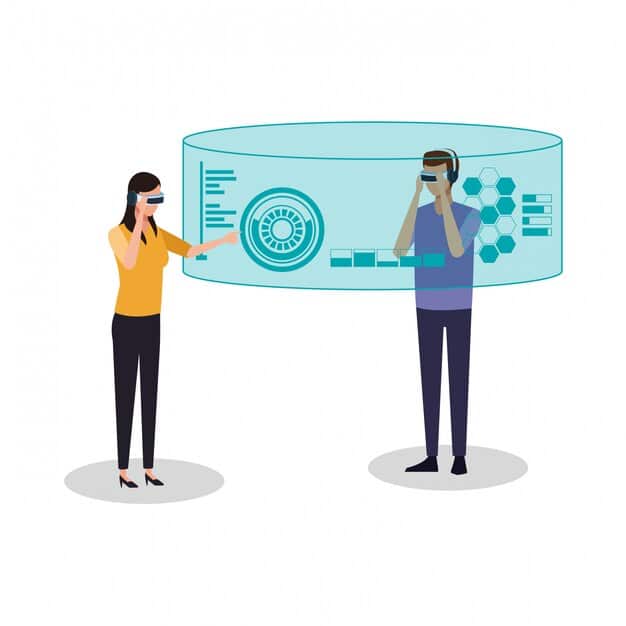AI Personal Assistants: What’s Next in the Next 12 Months?

Advertisements
The rise of AI-powered personal assistants continues to accelerate, promising significant advancements in convenience, personalization, and integration across various aspects of daily life within the next 12 months.
The relentless march of technology brings us ever closer to a future where artificial intelligence seamlessly integrates into our daily routines. One of the most visible manifestations of this trend is the rise of AI-powered personal assistants: what to expect in the next 12 months is a landscape of increased sophistication, personalization, and ubiquity, transforming how we interact with technology and the world around us.
Advertisements
The Evolution of AI Personal Assistants
AI personal assistants have evolved dramatically from simple voice command responders to sophisticated digital companions. Understanding this evolution is crucial to predicting the advancements we can expect in the coming year.
Early Stages of AI Assistants
Initially, AI assistants like Siri and Google Assistant focused on basic tasks such as setting alarms, making calls, and providing simple information. These early versions relied on keyword recognition and pre-programmed responses, often lacking the nuanced understanding of human language.
Advertisements
The Leap to Machine Learning
The integration of machine learning algorithms marked a significant turning point. AI assistants began to learn from user interactions, improving their ability to understand context, predict needs, and provide more personalized responses. This advancement paved the way for more complex functionalities.
Key milestones in the development of machine learning for AI assistants include:
- Improved natural language processing (NLP) for better understanding of user queries.
- Enhanced speech recognition accuracy, reducing errors and improving usability.
- Integration of predictive analytics to anticipate user needs and offer proactive suggestions.
As we look ahead, the application of these milestones and the introduction of new technologies promise to further refine and expand the capabilities of AI personal assistants.

Anticipated Advancements in the Next 12 Months
The next 12 months promise exciting advancements in AI personal assistants, with improvements across several key areas. These advancements will enhance user experience, making these assistants more capable and indispensable.
Enhanced Personalization
One of the most significant advancements will be in the area of personalization. AI assistants will become even better at understanding individual preferences, habits, and needs, allowing them to provide highly tailored recommendations and support.
Deeper Integration with Smart Homes
AI assistants are set to become more deeply integrated with smart home devices. This will enable users to control virtually every aspect of their home environment using voice commands or automated routines. Imagine adjusting lighting, temperature, and entertainment systems with a single command.
Proactive Assistance and Predictive Capabilities
Future AI assistants will move beyond reactive responses to offer proactive assistance. By analyzing user data and patterns, these assistants will anticipate needs and provide timely suggestions or reminders. This could include reminding you to leave for an appointment based on real-time traffic conditions.
Ethical Considerations and Challenges
As AI personal assistants become more powerful, it’s crucial to consider the ethical implications and challenges that arise. Addressing these concerns is essential to ensuring that these technologies are used responsibly and for the benefit of all.
Data Privacy and Security
The collection and use of personal data by AI assistants raises concerns about privacy and security. Users need to be confident that their data is protected against unauthorized access and misuse.
Bias and Fairness
AI algorithms can perpetuate biases present in the data they are trained on. This can lead to unfair or discriminatory outcomes, especially in areas like healthcare and finance. Careful attention must be paid to ensure fairness and equity.
Job Displacement and Economic Impact
The increasing automation enabled by AI assistants could lead to job displacement in certain sectors. It’s essential to consider the economic impact and implement policies to support workers affected by these changes.
- Developing transparent data governance policies
- Implementing rigorous testing and validation procedures to mitigate bias
- Investing in education and retraining programs for displaced workers

Impact on Various Industries
The rise of AI personal assistants is poised to have a far-reaching impact on various industries. From healthcare to retail, these technologies are transforming how businesses operate and interact with customers.
Healthcare
AI assistants can play a valuable role in healthcare by helping patients manage medications, schedule appointments, and access medical information. They can also assist healthcare providers in diagnosing illnesses and developing treatment plans.
Retail
In the retail sector, AI assistants can enhance the customer experience by providing personalized recommendations, answering questions, and facilitating purchases. They can also help businesses optimize inventory management and improve supply chain efficiency.
Finance
AI assistants are being used in finance to provide personalized financial advice, detect fraudulent transactions, and automate routine tasks. This can help consumers make better financial decisions and reduce costs for businesses.
AI-driven assistants in retail will likely:
- Personalize shopping experiences.
- Improve customer engagement.
- Streamline operations.
Predictions for 2025 and Beyond
Looking beyond the next 12 months, the future of AI personal assistants is even more exciting. We can expect these technologies to become even more integrated into our lives, offering a seamless and intuitive user experience.
Advanced Natural Language Understanding
AI assistants will continue to improve their natural language understanding capabilities, allowing them to engage in more complex and nuanced conversations. This will make interacting with these assistants feel more natural and intuitive.
Emotional Intelligence
Future AI assistants may even be able to detect and respond to human emotions. This would enable them to provide more empathetic and supportive assistance, particularly in sensitive situations.
Ubiquitous Integration
AI assistants will become seamlessly integrated into virtually every device and platform, from smartphones and smart speakers to cars and wearable devices. This will create a truly ubiquitous and always-on computing experience.
Preparing for an AI-Driven Future
To fully embrace the potential benefits of AI personal assistants, it’s essential to prepare for an AI-driven future. This requires investing in education, addressing ethical concerns, and fostering collaboration between industry, government, and academia.
Education and Skills Development
Investing in education and skills development is crucial to ensure that workers have the knowledge and skills needed to thrive in an AI-driven economy. This includes promoting STEM education, fostering digital literacy, and providing retraining opportunities.
Ethical Frameworks and Regulations
Developing ethical frameworks and regulations is essential to guide the responsible development and deployment of AI technologies. This includes addressing issues such as data privacy, bias, and accountability.
Collaboration and Innovation
Fostering collaboration between industry, government, and academia can accelerate innovation and ensure that AI technologies are developed in a way that benefits society as a whole. This includes supporting research and development, promoting open standards, and encouraging public-private partnerships.
| Key Point | Brief Description |
|---|---|
| 🚀 Enhanced Personalization | AI will understand user preferences deeply. |
| 🏠 Smart Home Integration | Control everything via voice or automation. |
| 🤖 Proactive Assistance | AI will anticipate and suggest based on patterns. |
| 🛡️ Ethical Consideration | Focus data privacy, bias, and fairness issues. |
Frequently Asked Questions
▼
AI assistants will analyze user data more effectively to provide personalized recommendations. This results in tailored experiences and adaptive support based on individual needs.
▼
AI assistants will act as central hubs to control smart devices via voice. It will allow users to automate routines, manage home environments, and enhance security.
▼
Enhanced encryption, transparent data policies, and user control over data usage are implemented to protect privacy. Continuous improvement is focusing on minimizing data breaches and misuse.
▼
Healthcare, retail, and finance will be significantly affected. AI assistants are being used to assist patients, enhance shopping experiences, and provide personalized financial advice, positively affecting these industries.
▼
Fairness, bias mitigation, and transparency in algorithms are crucial with education to promote its ethical use. It ensures the usage of AI is unbiased and benefits everyone.
Conclusion
As AI-powered personal assistants continue to evolve, they promise to transform our daily lives in profound ways. From enhancing personalization and smart home integration to addressing ethical considerations, preparing for this future requires a collaborative effort among industry, government, and individuals.